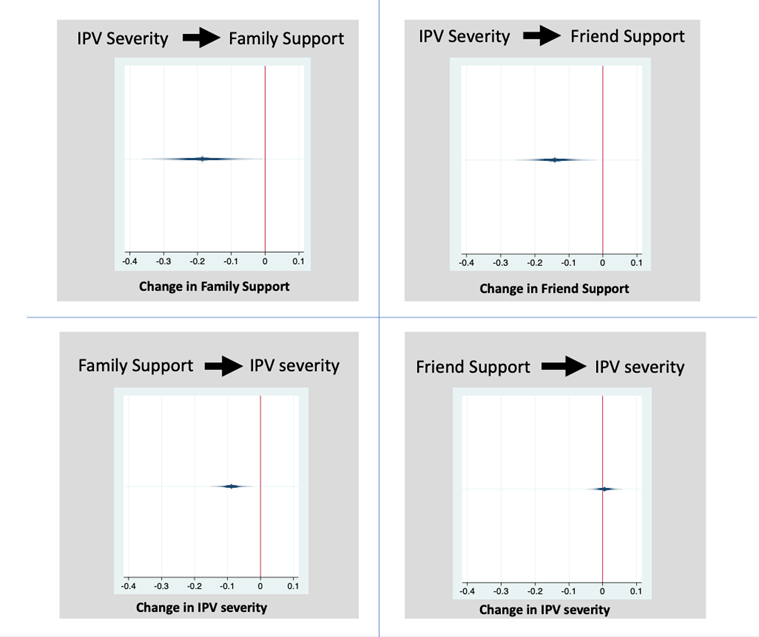While there are well-established links between social support and intimate partner violence (IPV), the directionality of this relationship has not been firmly established due to a dearth of longitudinal evidence. Using data from the Bachpan cohort study, a unique study that collected extensive social, demographic, mental health, and IPV information from women in rural Pakistan, Dr. Robin Richardson and collegues investigated the longitudinal association between IPV severity and social support. The full paper was published in SSM Population Health and the full text is here.
This work used comprehensive information about perceived friend and family support, measured with the Multidimensional Perceived Social Support Scale, and extensive information about women’s experiences of physical, psychological, and sexual IPV, which was measured with the World Health Organization’s Violence Against Women Instrument. The authors summarized IPV severity using an advanced measurement technique (confirmatory factor analysis). To compare the magnitude of relationships, the authors rescaled both IPV severity and social support so that they had the same score range, which is one innovation of this study. The analysis encompassed data from 945 women who were followed for three years.
In linear regression models that included a 12-month lag between exposure and outcome and controlled for a number of potential confounding factors, the authors found evidence of a bi-directional relationship between IPV severity and social support. Specifically, higher IPV severity led to reductions in both friend and family support, and higher family support led to reductions in IPV severity, although friend support did not.
Longitudinal associations between social support and IPV severity among women in Pakistan (n = 945)

Models controlled for interviewer, household asset score, educational level, age, age at marriage, family structure, treatment arm, family support, Adverse Childhood Experiences, depressive symptom score, total number of living children, and total number of living sons.
This study provides some of the most comprehensive information to-date on this relationship, as it is the first to assess the directionality between specific types of social support and IPV using the same dataset, and – by providing similar scaling of both IPV and social support – allows for a comparison of the magnitude of associations. Using this similar scaling revealed that IPV severity led to larger reductions in social support, when compared with the magnitude of the effect of social support on reductions in IPV severity. Interestingly, the authors’ search of the literature showed that the majority of cross-sectional studies in low- and middle-income country settings infer a relationship in the opposite direction, that high levels of social support reduce IPV. This finding suggests that IPV may have an under-acknowledged role in reducing social support.
This careful analysis revealed that family support may reduce IPV severity, whereas friend support may not. This result has important implications for the design of IPV-related interventions in Pakistan and similar contexts: in particular, study results indicate that IPV interventions that integrate family support may be especially effective at reducing IPV, whereas those solely focusing on friend support may be less effective. Third party intervention strategies, which rely upon community members to intervene when they witness abuse, have gained popularity recently, and these study results suggest that interventions may be especially effective if they include or emphasize third party intervention from family members.
Broadly, these results describe how social support and IPV may be intertwined in one context. This work underscores the important role that family support may play in mitigate IPV risk, and suggests that IPV interventions integrating family members may be especially effective.
Dr. Richardson was a Postdoctoral Research Fellow in the Psychiatric Epidemiology Training Program at Columbia University when the research was performed and is now starting a position at Emory.

